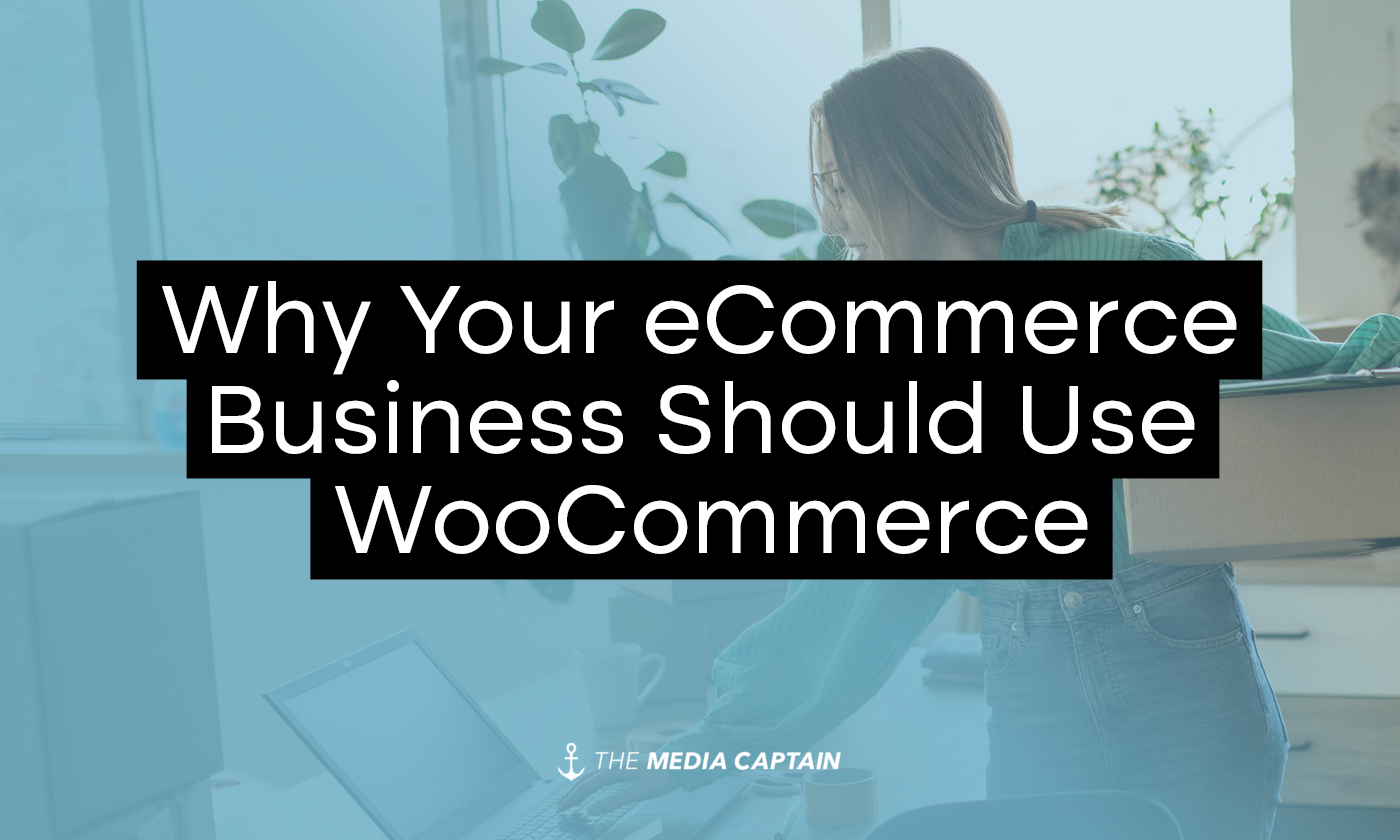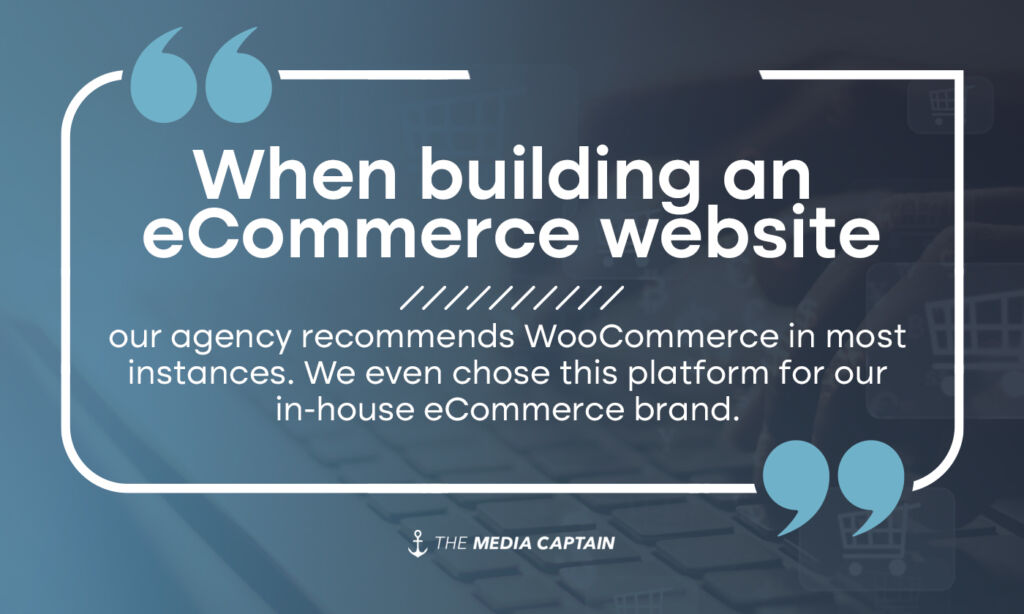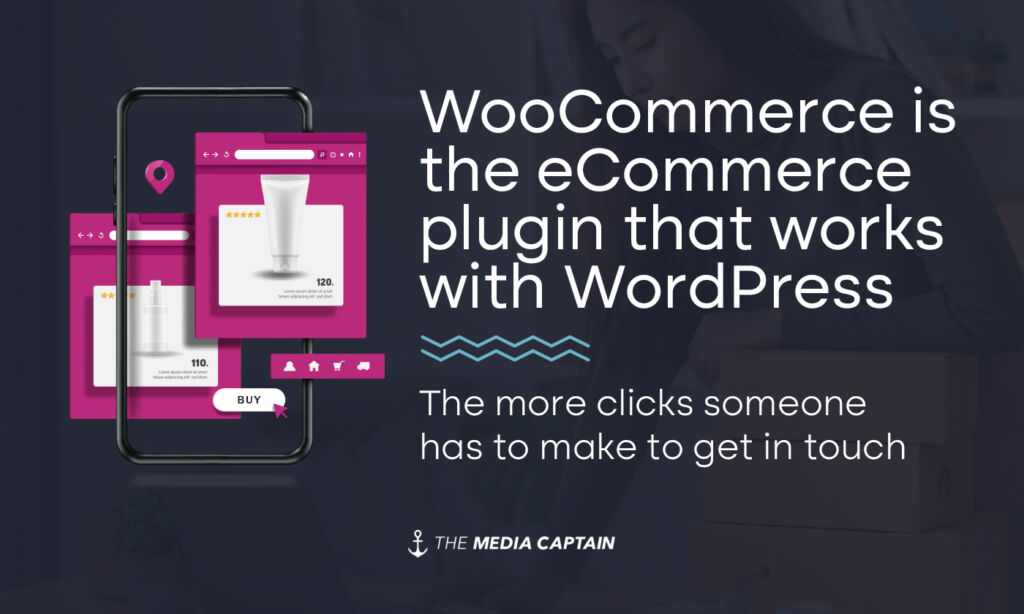Whether you’re launching your first eCommerce site or thinking about revamping your current website, you have a big decision to make. The eCommerce platform you choose will make a big difference in your site’s look, feel, and functionality. It’s a big commitment and investment, so you want to choose wisely.
There are many platforms available, such as WooCommerce, Shopify, BigCommerce, Magento, and more. Each has its benefits and drawbacks.
We’ve worked with hundreds of clients at The Media Captain across all these platforms. Our top recommendation is WooCommerce. We love and trust it so much that we chose to use it for our own in-house eCommerce business, DermWarehouse.
What is WooCommerce
- WooCommerce is the eCommerce plugin that works with WordPress, turning your WordPress site into an online store where you can sell products.
- According to HubSpot, WordPress is used by 45.8% of all websites on the internet and 65.2% of all websites that use a content management system. This makes it one of the most widely used platforms.
- WooCommerce is an open-source and customizable platform built for WordPress-based websites that want to create an online store.
- Open source means that developers can easily customize requirements on your eCommerce site. In layman’s terms, any customization you want on your site can be built.
There are many benefits to utilizing WooCommerce, and this article aims to help you understand why this is the platform our team recommends.
Need help building your WooCommerce site? Contact our team at The Media Captain!
Why The Media Captain Recommends WooCommerce
Customization & Flexibility
- When it comes to website customization, the sky’s the limit with WooCommerce. While many other platforms have limitations on what you can customize on your site, WooCommerce is open-source, meaning the source code is freely available and can be modified by developers. WooCommerce has thousands of plugins that have been developed, and if you can’t find something that suits your needs, you can have a developer build something new for you.
- Example: The DermWarehouse website is highly customized. One of the main reasons we chose WooCommerce was the flexibility to make any customization we wanted. One example is our subscription plugin. We were able to utilize the WooCommerce subscription plugin that already exists and make modifications to it in order to meet our needs. For example, we’ve customized the timeframes for customers to refill their subscriptions. We’ve also added customizations so that certain products and brands are easily excluded from discounted subscription pricing.
Checkout Process
- Many people complain about Shopify’s checkout because you can’t customize it. For certain businesses, they need a unique element to their checkout. Given that WooCommerce is open source, you can customize checkout to meet your needs.
- Example: We’ve customized the entire checkout on the DermWarehouse site. From adding special shipping options to showing customers how many loyalty points they’re accumulating on this page, these customizations have helped us increase our conversion rate on one of the most important pages on the site.
Large Selection of Themes
- WooCommerce themes are pre-built, easy-to-use templates that can transform the look and feel of your site. When it comes to creating the visual layout of your store, themes will make your site look amazing and save a ton of development time vs. designing the look of the site from scratch.
- We purchase all of our themes on ThemeForest. Themes on average range from $25-$100. Despite the one-time fee, the theme will save you countless hours of development time vs. starting from scratch. Our favorite theme for WooCommerce is the Gem theme.
- Even when using a theme, the look of your site can still be entirely customized so that it stands out and is not cookie-cutter.
Extensive Plugins
- The beauty of a plugin is that it quickly solves a problem for your eCommerce website that would otherwise need to be developed from scratch.
- Due to the customization of WooCommerce, if a plugin doesn’t meet your exact requirements, you can customize it further to give you exactly what you want.
- Example: For DermWarehouse, we utilize a plugin for all our shipping options on our website. In addition to what they offered out of the box, we wanted to add option for same-day processing. This shipping option allows us to charge extra for our shipping services that moves customers to the front of our shipping queue so their orders get out immediately.
- There are many great free plugins that you can utilize, and others vary in price depending on their functionality. The average cost is $50-75. Some charge annually and others charge just once.
User-Friendly Content Management System (Backend)
- Although there is a learning curve, the WooCommerce backend is intuitive and easy for non-technical users to manage.
- If you can confidently navigate Microsoft Excel and PowerPoint, then you can learn to manage the WooCommerce backend
- We show our clients how to add products and images, change verbiage and prices, track sales, make SEO updates, and more. This allows them to tackle less complex development items and utilize our dev team for more technical changes, saving time and money.
Pricing
- The core WooCommerce platform is free, so the initial setup costs are lower compared to some other eCommerce platforms. Main costs relate to hosting, themes, shipping carrier integrations, and more.
- Shopify charges a monthly fee that varies depending on your store size and plan but ranges from $39/month to $399/month (or more). With WooCommerce, you just have to purchase the theme and any plugins you plan to use. You’ll also have to pay for website hosting, which should be less expensive than Shopify.
- Learn More: How Much Does it Cost to Build a WordPress Site
Large Community & Support
- One of the biggest advantages of WooCommerce is the large developer community available for support. We’ve had so many clients come to us in a panic because they’re utilizing a lesser-known platform and can’t find a developer who knows how to make the changes they need. With WooCommerce, finding help on the development side is very easy.
- Due to its open-source nature, WooCommerce is constantly evolving with new features and functionality added over time. Store owners can leverage this ongoing innovation.
- This also means the developer community can quickly find and fix security and functionality issues. Chances are, if you’re having a problem with one of the plugins on your site, others are too. This leads to fast solutions.
- Over the years, we’ve hired many WordPress/WooCommerce developers, and they’ve been able to pick up where others have left off.
Integration Capabilities
- WooCommerce allows integration with all major third-party services like POS systems, CRMs, shipping carriers, and more. This allows businesses to customize their online stores to their specific needs. It also gives you a lot of choices when choosing other eCommerce software for your business.
- When API connections are needed, WooCommerce is at the forefront of being able to integrate seamlessly.
SEO Advantages
- All eCommerce platforms are going to tout their SEO advantages. We still haven’t found one that compares to WooCommerce.
- With out-of-the-box plugins like Yoast, store owners can easily optimize product and category pages for search engines.
- The customization of WooCommerce also allows you to design and enhance pages to appease search engines. With Shopify, you’re stuck with more out-of-the-box solutions from a design perspective.
- Example: On our product category pages for DermWarehouse, we could add verbiage at the top and bottom of the page. This text is extremely important in helping us rank for our categories, such as “acne” or “exfoliating cleansers”
When It Makes Sense to Use Shopify Over WooCommerce
While our agency prefers WooCommerce generally, we also build a lot of Shopify sites and feel that there are times when this platform makes more sense:
- Shopify can be better suited for smaller businesses managing all online and brick-and-mortar operations on a limited budget. Shopify’s platform can simplify operations.
- If a business wants its eCommerce store up and running quickly, Shopify is more beginner-friendly, requiring less technical skills upfront than WooCommerce.
- If you’re an eCommerce entrepreneur without much technical expertise to manage the website and just want to focus on your storefront and selling. Shopify handles the hosting, security updates, and more behind the scenes.
- Shopify works well for startup eCommerce businesses that need essential store functions and don’t require heavy customization. Shopify has lots of built-in features to cover the basics.
- If you love the layout of a Shopify site and want to replicate it without having many modifications, it would make sense to move forward with a Shopify site.
- Shopify has an amazing community of developers and apps and is the largest eCommerce platform.
In Closing
- When building an eCommerce website, our agency recommends WooCommerce in most instances. We even chose this platform for our in-house eCommerce brand.
- We’ve been using WooCommerce for our in-house eCommerce brand since 2016. It’s allowed us to scale from 0 to over 400,000 customers. Along the way, we’ve been able to customize to meet our exact needs.
- What sets WooCommerce apart is that it’s an open-source platform that allows for as much customization as you require. Even if you’re just starting, make sure you’re thinking years down the road and what you may want to add to your site.
- WooCommerce has extensive plugins and themes, so you won’t have to start from scratch with the functionality needed for your site.
- There’s a huge community of WooCommerce developers, so finding someone to help customize or fix your website will never be an issue.
- While WooCommerce is our preferred platform, there are instances when it makes sense to utilize a simpler platform such as Shopify.




